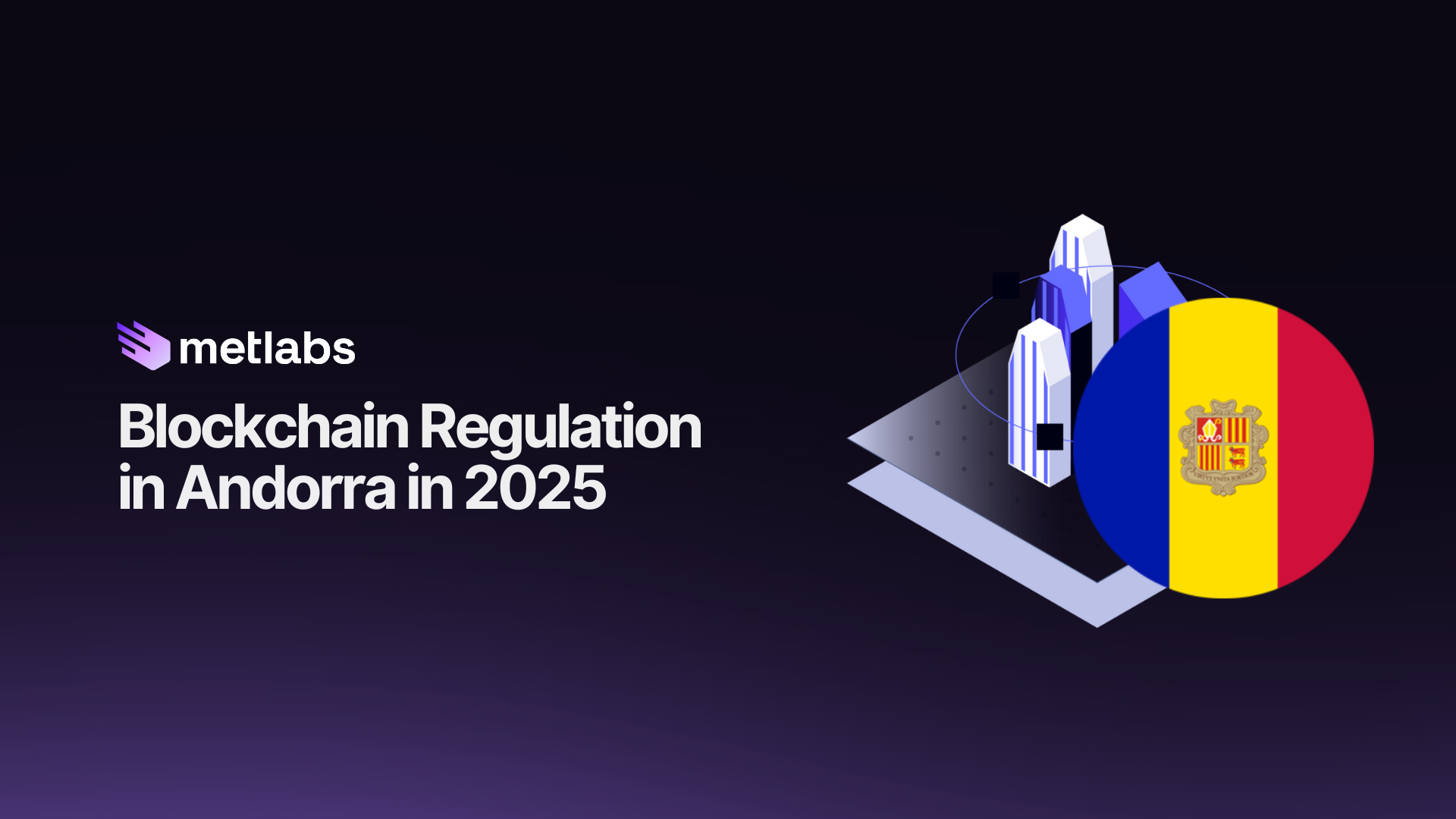The adoption of blockchain technology and asset tokenization is advancing at a rapid pace, but the real engine driving its global development is the existence of a clear, consistent and innovation-friendly legal framework.
Some countries have already established themselves as regulatory benchmarks, establishing specific rules for cryptoassets, DLT infrastructures and token issuance with legal backing. In this article we show you relevant information about blockchain regulation in Andorra, which you can use as a guide if you are looking to operate internationally or evaluate different strategic locations.

Current legislation on blockchain and virtual assets in Andorra
Law 24/2022 on Digital Assets
It comprehensively regulates the issuance, custody, exchange and supervision of digital assets and cryptocurrencies in Andorra. This regulation defines the taxonomy of digital assets, establishes licensing requirements, advertising procedures and token categorization, and reinforces investor protection and transparency in the use of DLT and blockchain technologies.
Decree 478/2022, Regulation of the Digital Overseer
Develops the figure of the digital overseer, establishing its functions, suitability requirements and oversight obligations on issuers, custodians and platforms of digital assets. The digital overseer must be a lawyer or licensed economist, and acts as guarantor of regulatory compliance before the AFA. The regulations also detail the disciplinary and sanctioning regime.
Law 10/2021, on Measures for the Prevention and Fight against Money Laundering
Imposes AML/CFT compliance obligations on all service providers linked to digital assets. VASPs must register with the AFA, apply KYC procedures and report suspicious transactions to UIFAND. The law incorporates international FATF guidelines and is part of the national preventive system, being fully applicable to issuers, platforms and custodians.
Tokenization makes it possible to digitally represent real-world assets through blockchain, but for it to have legal value, it is essential that there is a regulatory framework that recognizes this operation. [COUNTRY] adopts its own approach, establishing specific rules for the issuance, custody or trading of tokens. In this block we explain how asset tokenization is regulated from a legal point of view, taking as an example an advanced jurisdiction such as Andorra.
Regulation of asset tokenization in Andorra
Asset tokenization in Andorra is mainly regulated by Law 24/2022, which provides an advanced and specific legal framework for the digital representation of financial and non-financial assets through distributed registry and blockchain technologies.
The law establishes clear procedures for the issuance of utility, security and stablecoins tokens, as well as for custody, exchange and trading on authorized platforms. Issuers and operators must obtain a license granted by the Andorran Financial Authority (AFA), meet capital requirements, insurance and appoint a registered digital overseer, responsible for regulatory interlocution and supervision. The regulation contemplates the possible creation of market infrastructures such as the Andorra Digital Exchange, and regulates the publicity, governance and transparency of tokenized projects.
For non-financial assets, tokenization is analyzed on a case-by-case basis, in addition to the obligations for the prevention of money laundering and terrorist financing according to Law 10/2021, under the supervision of UIFAND. Likewise, Andorra has since 2023 a regulation for controlled testing environments (sandbox), although it does not participate in the European DLT pilot scheme.
Regulatory bodies and authorities for digital assets in Andorra
Andorran Financial Authority (AFA)
Supervises financial markets and is the competent body to authorize and oversee activities related to digital assets in the country. It supervises token issuers, trading platforms, custodians and entities offering financial services linked to blockchain. It evaluates applications for authorization and may impose sanctions.
Digital Overseer Registration
Mandatory figure who acts as an authorized representative before the AFA for each digital asset project. It can be a legal entity, lawyer or economist registered in Andorra and meet requirements of experience, solvency and tax residency. Its functions include interlocution between the company and the AFA, supervision, legal consultancy and incident reporting.
Andorran Financial Intelligence Unit (UIFAND)
It is the body responsible for the prevention of money laundering and terrorist financing in Andorra. It oversees compliance with AML/CFT obligations by digital asset service providers. Entities must register with UIFAND, implement KYC policies, monitor operations and report suspicious activities.
Launching a business based on digital assets requires more than just technology: it is also necessary to comply with legal requirements such as licensing, registration and regulatory obligations. These conditions ensure that the business model is viable and sustainable over time, and that it complies with transparency and fraud prevention standards. In this section we explore what licenses are usually required and what compliance criteria blockchain companies operating in Andorra must follow.

What licenses and requirements are needed to trade cryptoassets in Andorra?
Authorization according to Law 24/2022
Any legal entity wishing to issue, hold or trade digital assets in Andorra must obtain express authorization from the AFA. It is required to analyze the business model, the technological systems, the suitability and solvency of the administrators, the financial capacity, the minimum capital and the contracting of a civil liability insurance. In addition, it is mandatory to appoint a registered digital overseer as an authorized representative before the AFA.
AML/CFT Registration with UIFAND
All digital asset operators must be registered in the UIFAND register of obliged parties and comply with the regulations for the prevention of money laundering and terrorist financing. This involves customer verification policies (KYC), identification of beneficial owners, risk management, internal training and periodic reporting. UIFAND may suspend or cancel registration in case of serious non-compliance.
Technical requirements and legal documentation
Token issuers must submit to the AFA detailed documentation on the operation of the digital asset, its legal link to the underlying, issuance conditions, security of technological systems, auditability of the distributed registry and protection against operational failures. All these requirements are evaluated by the AFA before authorizing the project, and the digital overseer supervises regulatory compliance.
Are you exploring developing your blockchain project in Andorra?
At Metlabs we help companies like yours and offer comprehensive support in the development of blockchain projects and tokenization of assets such as real estate, carbon credits, commodities, intellectual property, financial instruments, franchises and more, fully aligned with blockchain regulation in Andorra and international regulatory standards.
Contact us and find out how we can help you meeting all your business model needs, from technical validation and structuring to design, development and implementation of custom blockchain solutions, ready to scale from day one.



